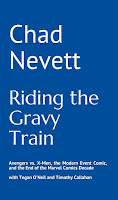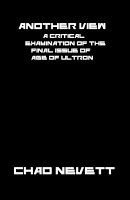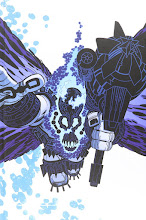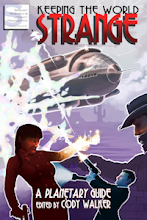March Book Club response:
John Constantine's characterization is a slippery thing. Alan Moore clearly crafted him as a stand-in for the mythical Trickster, all promise and no reward. Jamie Delano saw Constantine more as a man than anything else, given to arrogance, mistakes and petty feuds. Garth Ennis made Constantine an iconoclast, playing one side against the other, often with purpose but occasionally just for fun. Warren Ellis, naturally, saw Constantine as a smoking, contemplative Speaker Of The Truth, a magician, surely, but more importantly someone with whom to shake society to its core. Brian Azzarello realized at some point that Constantine's one defining characteristic is that he is the outsider in any gathering. Because of who he is and what he has done, he can never be at peace or fit into a crowd; instead, he must discover how to use people around him to survive, which is still best demonstrated in "Hard Time."
As a casual reader of Hellblazer with not a little affection for a taut Constantine story of bastardy, remorse and magic, the collection "Rare Cuts" was oddly affecting and pleasing to me. More a singles collection than a coherent stories, I feel, having read it, that I know John better than I ever have.
The first tale in the book is the headliner, obviously. John's disaster at "Newcastle," written by Delano with art by Richard Piers Rayner and Mark Buckingham, is perhaps the moment most writers of the series have used to explain when and how Constantine came to be. As such, I found it a rather odd turning point, jumbled with side characters who contributed little and actually diminished John's crime in believing he was smart enough to casually summon a demon. Contrary to Steve's assessment, I think Constantine is written in such a way as to play down what he did at Newcastle, asylum or no. In the passage quoted below, John is fairly bragging about his failure while also diminishing it as a youthful indiscretion.
Futher, I find the explanation of Newcastle and the associated mental breakdown to be all too neat in the creation of the psyche of Constantine. At his best, his motivations are entirely inscrutable and delightfully manipulative, a street-level Hamlet whose hand is always shown at the last moment; he always hits the flush, too. This is the kind of origin given in most superhero comics. Given the character's beginnings, that isn't surprising. Newcastle does not contribute to my understanding of John; the moment that changed him is more exciting as a McGuffin than a known quantity.
It's for this reason that I found far more satisfying and revealing the two-part story that followed, "Early Warning" and "How I Learned to Love the Bomb" by Grant Morrison and David Lloyd. Here's the thing with this story: John Constantine is not really trying to save the town. He's there to watch its death-throes, learn from it and hopefully save the woman he's seeing.
The revel in the village, the return of carnival (which, lest we forget, can mean an instance of riotous success) is the ultimate collision of England's dual nature. Like much of Europe, the country lived in uneasy alliance between the Pagan and Christian traditions for centuries before forgetting the past, like the true meaning of May Day, the origin of the name Easter or the reason for the date of the observance of Christmas.
The symbolism of the story is not complex. When restraints on behavior are removed, the repressed are most likely to have the darkest Id. The village devolves into rape, violence and zealotry. The purest example, and the driving force of the story, is the Anglican priest who ultimately attempts a nuclear strike to save humanity. His character strikes me as hollow. It suits the story's premise, naturally, but it leans too heavily on the supernatural component to the tale. With most tales of Constantine, the magic is subdued and easily explained and savage. The village was looking for an excuse to act out their frustration over the unemployment and squalor that has come to characterize their lives. Whatever spell is actually present merely offered an excuse for the horrifying behavior just beneath the surface. That's the element that makes this a horror story -- not that magic can cause people to do unleash the worst of mankind, but that manking is capable of it in the first place if given an excuse.
I actually find in Morrison's writing here an evocation of the attempts to explain how Germany allowed itself to become a monument to evil, violence and hatred prior to World War II. People driven to extreme circumstances will latch onto anything offering an answer, no matter the cost to one's soul. Constantine does fight to save the town here, but only to save its people, not the institution. Whether there can be an answer to their woes is uncertain, but recognizing the problem is as important. This sort of case is what Constantine is really here for. He destabilizes a situation to the point that it might tip away from greatest injustice. He fails here, as he often does. But his presence gave the village a chance for survival, and many of the people made it, despite the hole that takes the place of their former home.
John Constantine is not a hero, and should never be confused for one. He's a man with a heart and a brain, which can be just as good in a tight spot.
Wolverine #48 annotations
9 hours ago






